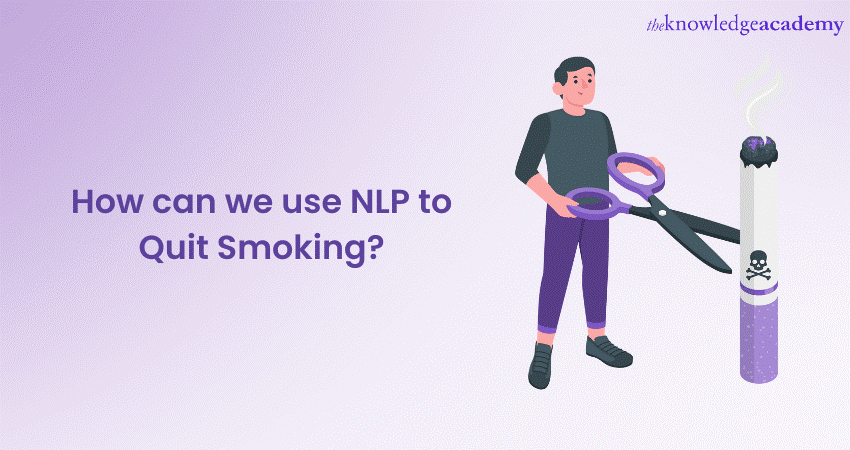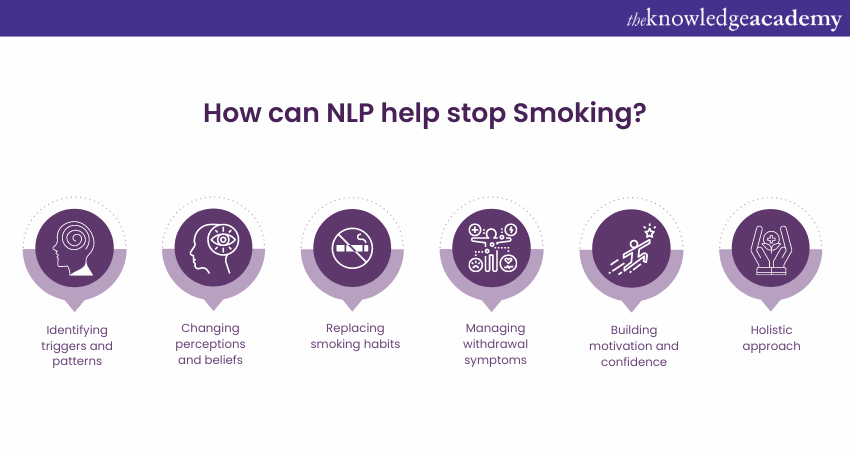We may not have the course you’re looking for. If you enquire or give us a call on + 1-866 272 8822 and speak to our training experts, we may still be able to help with your training requirements.
We ensure quality, budget-alignment, and timely delivery by our expert instructors.

Smoking is a widespread addiction that affects millions of people worldwide. Despite the well-known health risks that are associated with Smoking, quitting can be incredibly challenging. Traditional methods often fall short in helping individuals break free from this habit. However, with the emergence of Neuro-Linguistic Programming (NLP), there is renewed hope for those looking to quit Smoking. This blog will explore how to use NLP to Quit Smoking and help individuals overcome their Smoking addiction and lead healthier lives.
Table of Contents
1) Introduction on how to use NLP to Quit Smoking
2) How can NLP help stop Smoking?
a) Identifying triggers and patterns
b) Changing perceptions and beliefs
c) Replacing Smoking habits
d) Managing withdrawal symptoms
e) Building motivation and confidence
3) Applying NLP techniques to stop Smoking
4) Conclusion
Introduction on how to use NLP to Quit Smoking
Before delving into the effectiveness of NLP in quitting Smoking, it is crucial to understand the nature of Smoking addiction. Smoking is a habit-forming behaviour that involves both physical and psychological dependencies. Nicotine, the addictive substance in cigarettes, creates a physical addiction by altering brain chemistry. Furthermore, Smoking becomes deeply ingrained in daily routines, making it difficult to break free from the psychological attachment.
Neuro-Linguistic Programming (NLP) can be defined as a psychological approach that emphasises the connection between neurology, language, and patterns of behaviour. It offers a range of NLP Techniques and strategies to understand how people think, communicate, and change their behaviours. NLP operates under the belief that by modifying our patterns of thought and language, we can achieve personal excellence and overcome limiting beliefs. One can use NLP exercises to quit Smoking, some of which we have delved into detail as follows.
How can NLP help stop Smoking?
Neuro-Linguistic Programming (NLP) offers valuable techniques and approaches that can significantly aid individuals in their journey to stop Smoking. By addressing the psychological aspects of addiction and focusing on behaviour modification, NLP Strategies provides a comprehensive framework for achieving successful Smoking cessation. Here are some key NLP techniques to stop Smoking:

Identifying triggers and patterns
NLP emphasises the importance of understanding the psychological triggers that contribute to Smoking. These triggers can be diverse and may include stress, boredom, social situations, or certain emotions. By identifying these triggers, individuals can develop alternative strategies to cope with them effectively. Benefits of NLP Training helps individuals gain awareness of their thought patterns and associations, enabling them to break free from the automatic response of reaching for a cigarette.
Changing perceptions and beliefs
One of the core principles of NLP is reframing, which involves changing the way individuals perceive Smoking and their beliefs surrounding it. Often, smokers associate Smoking with pleasure, stress relief, or a way to socialise. Through NLP techniques, such as guided visualisation and cognitive restructuring, individuals can challenge and modify these deep-rooted beliefs. By reframing Smoking as a harmful and undesirable habit, individuals can develop a strong internal motivation to quit.
Replacing Smoking habits
Smoking is not just a physical addiction but also a habitual behaviour deeply ingrained in daily routines. NLP provides strategies to break these habits and replace them with healthier alternatives. By utilising techniques like anchoring, individuals can create new associations and rituals that do not involve Smoking. For example, they can establish an anchor for relaxation or stress relief that serves as a substitute for the urge to smoke. NLP helps individuals disrupt the automatic response of reaching for a cigarette, allowing them to adopt healthier coping mechanisms.
Managing withdrawal symptoms
Withdrawal symptoms can be a significant challenge when quitting Smoking. NLP techniques assist individuals in managing these symptoms by reframing their perception of discomfort. By shifting the focus from discomfort to the positive aspects of quitting, individuals can reframe withdrawal symptoms as a temporary and necessary part of the healing process. NLP also provides tools to regulate emotions and reduce cravings, enabling individuals to navigate the challenging phases of quitting with greater ease.
Building motivation and confidence
Motivation and confidence play crucial roles in the process of quitting Smoking. NLP offers various techniques to build and strengthen these essential components. Through visualisation exercises, positive affirmations, and goal-setting, individuals can enhance their motivation to quit and reinforce their belief in their ability to succeed. NLP empowers individuals by helping them tap into their inner resources and unlock their full potential to overcome Smoking addiction. One effective method is using NLP Dissociation Techniques to help individuals detach from cravings and negative patterns associated with smoking.
Holistic approach
NLP takes a holistic approach to Smoking cessation by considering the interconnectedness of mind, body, and emotions. It acknowledges that Smoking addiction is not solely a matter of willpower but is influenced by various internal and external factors. By addressing both the psychological as well as emotional aspects of addiction, NLP complements other quitting strategies, such as nicotine replacement therapy or counselling. It provides individuals with a comprehensive toolkit to create lasting change and increase the chances of successful Smoking cessation.
Take control of your mind and transform your life with NLP by joining our Neuro-Linguistic Programming Courses today!
Applying NLP techniques to stop Smoking
Various NLP techniques can be applied to quit Smoking successfully. Some of the most commonly used techniques include:
1) Anchoring: Anchoring involves associating a positive state of mind with a specific gesture or action. By creating an anchor for relaxation or confidence, individuals can use it as a substitute for the urge to smoke. Understanding NLP Learning Styles can further enhance this process by tailoring the anchoring technique to the individual's preferred way of learning and responding.
2) Reframing: Reframing allows individuals to reinterpret their experiences and thoughts about Smoking. It helps them view Smoking in a negative light, emphasising the detrimental effects on health and well-being.
3) Timeline therapy: Timeline therapy involves revisiting past memories and events related to Smoking and reframing them. By altering the perception of these memories, individuals can detach themselves emotionally from Smoking.
4) Swish pattern: The Swish pattern technique involves mentally replacing the urge to smoke with an image of a healthy alternative behaviour. This technique helps break the automatic response of reaching for a cigarette.
5) Parts integration: Parts integration aims to resolve the internal conflicts individuals may have regarding Smoking. By integrating conflicting parts of oneself, individuals can align their desires and motivations toward quitting Smoking.
6) Hypnosis: Hypnosis is often used in conjunction with NLP Hypnosis Techniques to enhance the effectiveness of Smoking cessation. It helps individuals access their subconscious mind and reprogram deep-seated beliefs and habits.
Conclusion
In conclusion, NLP offers a powerful and effective approach to stop Smoking by addressing the psychological aspects of addiction and behaviour modification. Through techniques that focus on triggers, perception, habit-breaking, withdrawal management, motivation, and a holistic approach, NLP equips individuals with the necessary tools to overcome Smoking addiction and embrace a healthier, smoke-free life. Hope this blog gave you all you needed to know about how to use NLP to Quit Smoking!
Unlock your potential and master the art of NLP by joining our comprehensive NLP Training Courses now!
Upcoming Business Skills Resources Batches & Dates
Date
 Neuro Linguistic Programming
Neuro Linguistic Programming
Fri 6th Jun 2025
Fri 29th Aug 2025
Fri 24th Oct 2025
Fri 26th Dec 2025
Fri 13th Feb 2026
Fri 17th Apr 2026
Fri 12th Jun 2026
Fri 14th Aug 2026
Fri 13th Nov 2026






 Top Rated Course
Top Rated Course



 If you wish to make any changes to your course, please
If you wish to make any changes to your course, please


